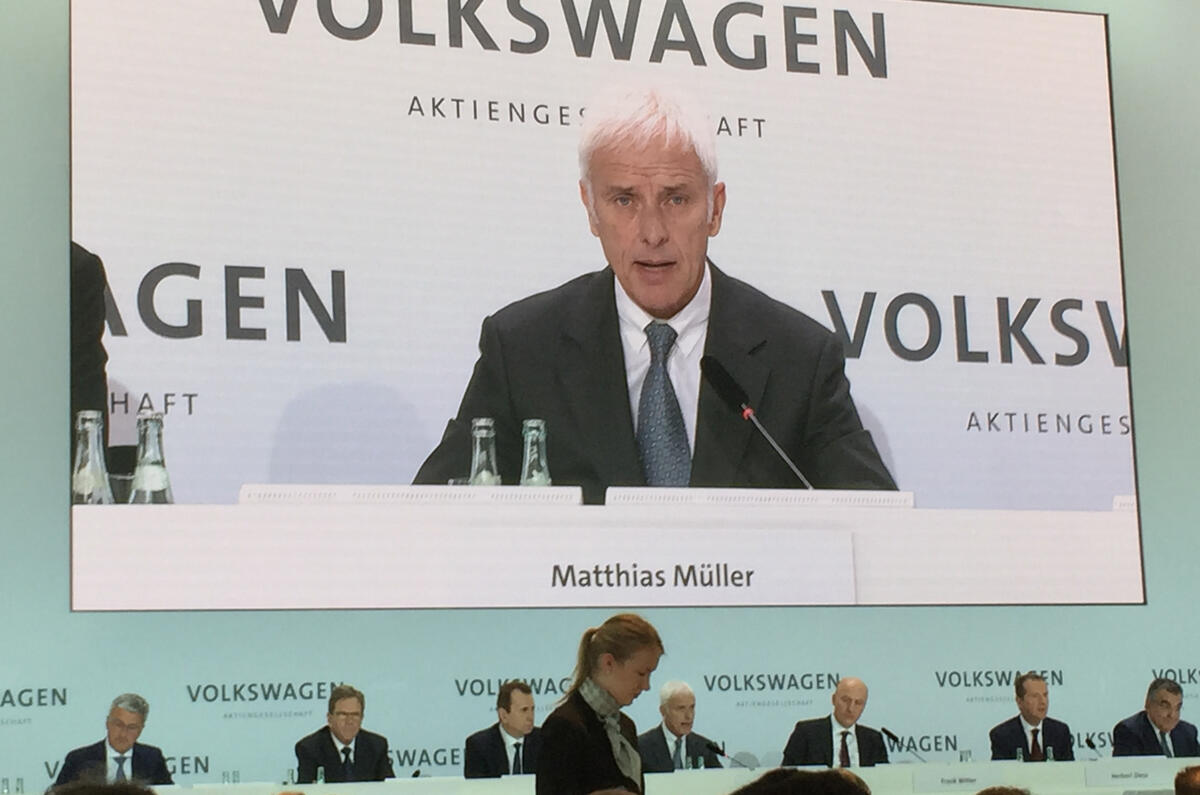Predictably, today’s Volkswagen Group annual conference didn’t shed much new light on how the firm will dig its way out of the emissions crisis, but there was insight along the way.
Remarkably, official documents contained one potential smoking gun. Take this for an admission: “In the past… even minor decisions were frequently made by the Board of Management, or its Chairman. In the future, many decisions will be delegated”.
A reference to the fact the fact that the former chairman or his board had been complicit in allowing the dieselgate scandal to happen? Nobody was saying, under strict orders to remain schtum until the official report is published at the end of the year, but it’s not difficult to read between the lines.
There was the revelation that the Group is behind on fixing vehicles affected by dieselgate, and the admission that VW Golf updates will now happen before those of the VW Passat because the fix for the latter has yet to be approved. It will come in weeks, VW boss Herbert Diess promised, but you have to ask why German authorities have delayed approval.
Compensation? Depends where you live, said VW Group boss Matthias Müller, but he emphatically ruled out US-style compensation everywhere. “This will not happen,” he said, without being drawn on why not.
The US market in future? Drawing raised eyebrows among the assembled hacks, Diess described it as “the market with the most potential for Volkswagen”. It was an emphatic message that the firm wouldn’t give up on the market, although Diess later conceded “we are starting from almost zero” and said his confidence was based on knowing what was coming in the future product plan.
Budget cars? The proposed new brand for China remains on track, with two budget SUVs in planning with the firm’s joint venture partners FAW. They remain unlikely to be sold in other markets, though, with insiders suggesting VW’s engineers remain flummoxed as to how to build Dacia rivalling cars at a profit.
Electric cars were also on the agenda, with confirmation that the bespoke MEB platform will underpin at least one car by 2020, and that a family of vehicles will use it. Manufacturing is likely to start in China, where demand for electric cars is expected to be greatest, and the types of cars on the roads will take a “quantum leap” in a new direction.
There was an element of humour, when the board was quizzed on why the decision was made to use a cheat device when the fix is so relatively simple (half an hour of work, all in, for most models, they claim). “We often ask ourselves that same question,” said Müller, breaking into his only smile of the nearly three hour long session.
It was interesting, too, to watch the body language of the assembled bosses. Müller was all business, Diess slightly more charismatic and off-the-cuff, others regimented, with the exception of Audi boss Rupert Stadler who was not questioned once, having conducted Audi’s own results announcement back in March. By the conclusion of proceedings, he began to look either like a man who had flown back from the Beijing motor show not long ago and was starting to suffer, or who could feel his phone vibrating in his pocket as a mountain of urgent emails piled up while he was sat in a session he was playing no part in.




Join the debate
Add your comment
Dieselgate. How will the upgrade affect reliability
Game face on
More shocking arrogance